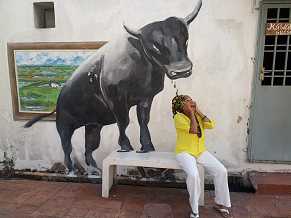
I’ve never worked in a school with coloured people.
I looked at her wondering why she felt the need to tell us that. The day I submitted my poem, I found out why.
That moment when you submit a piece of work and you’re standing at the teacher’s desk not quite able to read what their thoughts are.
Bring the book where you copied this from! I didn’t copy it, Miss. I just wrote it. Honestly! BRING… THE… BOOK… WHERE… YOU… COPIED… THIS… FROM!
She said it a little louder this time but it was exactly the same words. I wasn’t sure if I should follow suit and repeat myself or if I should add something else for effect. I decided to add, “really”
Miss, I didn’t copy it. I really didn’t. I love writing poems. Can you ask everyone?
The room had gone quiet at her second request. There was some tension. After all, she was a new teacher. We had no relationship. No love or hate. She had just arrived. My peer’s words of support came flooding through though. They did not let me down.
Miss, she always writes stories! That’s her thing! She’s written loads! She just sits down and the words flow! She’s a natural poet!
The short, small framed woman in her woolen skirt, Marks and Spencer cardigan, flat shoes, light colored tights and age which showed that she was close to retirement, was not about to succumb to a rowdy group of comprehensive school girls.
Girls whose parents had come from the Caribbean as part of the Windrush era, from Ghana in response to Rawlings military rule and from Cyprus after the Turkish invasion.
Be quiet and you, you bring the book where you copied this from or you’ll be staying behind for detention this evening.
I sat in the detention room wondering why she hadn’t believed me. I lived in a world where colour affected everything and her initial introduction went through my mind. I would have to explain this to mummy.
The journey from school to home was 15 minutes. There was no reason (as far as mummy knew) why I shouldn’t be home already.
I’ve never worked in a school with coloured people.
Well, now that she had, was this how we could expect to be treated? White elderly teachers from rural places coming into the city with low expectations of us “coloured people?”
My drama teacher was white. Celebrating the words which I brought to the Motherland play as she commented on my ability to understand the women who had come to England in the 1950s and 1960s. My mother was one of those women. Of course, I understood. I knew her joy and her pain.
As I stood in front of my audience in Boston, then in New York and finally in Washington, I remembered her. My first poetry book had been published and the book tour and readings had been organized by a team who celebrated my work.
Exploring all of me was the final result. I had written about feminism, racism, black history, personal relationships, small and big politics, sexual abuse and love.
These were poems which had been waiting to be released after my three-year university sentence. Poems which should have formed part of an anthology, but which kept coming, one, then two, then, three. The staff of the young women’s writing group was astounded and excited.
You two will have your own books! One each!
You have come in second place in the Black penmanship awards for your poem, “What being black means to me.”
My English teacher reminded us to read books which had been written by women “who look like you.” He was married to a French woman and experienced prejudice. He had some understanding of what we experienced. However small, it was significant and he knew that he could not teach us about the black triumphs and struggles.
I read Maya Angelou, Michelle Wallace, Audrey Lorde, Alice Walker, Ntozake Shange, Ralph Ellison, Toni Morrison, James Baldwin, Jean Binta Breeze, and Zora Neale Hurston. I read them and felt my air supply expand for they too wrote about our relationships, hair, racism, abuse, love, and politics.
I am sorry that you did not believe me. Not because I needed your permission. Those poems were air, and they allowed me to breathe. There was nothing that you or anyone else could do to stop that. Your not believing me, though.
That denied you the excitement and entrance into worlds where we all connect.
Mbeke Waseme is a LeapEd senior education advisor and lead coach in Kuala Lumpur, Malaysia.
She has published poetry, Exploring all of me, and Make the changes, feel the joy, a self-help book. She has worked as a writer, a photojournalist, and a DJ. She has taught in the UK, Cameroon, Ghana, Jamaica, and the US.
Her short stories and poems have been published in Pure Slush, The Writers Café, and Dove Tales.
Related in this issue
Poetry by Mbeke Waseme, “The stories are where healing lies“
